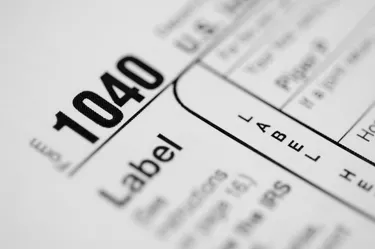
In the 1980s, when taxpayers struggled through the twists and turns of their federal tax returns, some believed that Form 1040 was an endangered species. After all, once tax preparation firms and millions of taxpayers were using computers to calculate their taxes, the Internal Revenue Service knuckled down and implemented electronic tax returns in 1986. This act allowed taxpayers to file tax returns from personal computers to IRS computers.
While electronic filing did eliminate the cardinal use of paper go-betweens, the need for individual tax return forms did not disappear, but rather, it evolved. Although Forms 1040EZ and 1040A are relics of the past, the need for forms, such as the 1040 and 1040-SR, persists.
Video of the Day
Video of the Day
IRS Forms: 1040A, 1040 Differences
To file your individual federal tax return, you'll use the IRS Form 1040 or, if you're a senior, you can optionally use the Form 1040-SR. The 2018 tax year marked the end of the use of Forms 1040EZ and 1040A, and for good reason.
IRS Form 1040A
Before the tax year 2019, after you reported your income, you could use Form 1040A to claim adjustments and calculate your adjusted gross income. For instance, you could rely on Form 1040A to claim a deduction for IRA contributions and student loan tuition payments and interest.
Unfortunately, the IRS Form 1040A was a complex beast that likely contributed to the 8.23 billion hours that taxpayers spent complying with the tax code in 2018, according to the National Taxpayers Union Foundation. These hours were spent record-keeping, learning about tax law, completing forms and schedules and submitting data to the IRS.
The complexity of Form 1040A was due, in part, to the use of the document to report information about a number of tax breaks, such as childcare and retirement savings. Even so, the form offered less support to a taxpayer's pleadings for allowable deductions and credits than did the standard 1040.
Read more: Form 1040 What You Need to Know
Stipulations for Form 1040A's Use
In the tax year 2018, if a taxpayer didn't meet the criteria for the use of Form 1040-EZ, she could use Form 1040A if the following were true:
- The taxpayer's filing status was one of the following: single, married filing jointly, married filing separately, qualifying widow or widower or head of household.
- The taxpayer's taxable income was less than $100,000.
- The source of the taxpayer's income was wages, salaries, tips, taxable scholarships or fellowship grants, interest, ordinary dividends, capital gains distributions, pensions, annuities, IRAs, unemployment compensation, taxable Social Security or railroad retirement benefits or Alaska Permanent Fund dividends.
- The taxpayer did not itemize deductions.
- The taxpayer didn't have an alternative minimum tax adjustment on stock that she acquired by exercising a stock option.
- The taxpayer's only adjustments to income were deductions for an IRA, student loan interest, educator expenses or tuition and fees.
- The only credits the taxpayer claimed were for child and dependent care expenses, EIC, the elderly or the disabled, education, child tax credit, premium tax credit or the retirement savings contribution credit.
Read more: About the New Form 1040
IRS Form 1040
President Lincoln signed an income tax law, which was succinctly described as legislation that was needed to defray the expense of government and pay interest on the public debt. Today, even the tax forms are anything but short and sweet.
Prior to tax year 2019, you used to use Form 1040 if your earnings were considerable, your investments were complex and/or you had tax credits to claim and deductions to itemize. Starting in 2018, however, there is no more weighing the option of using 1040-A or 1040-EZ. Instead, the IRS has decided that, unless you are a senior, you'll use IRS Form 1040.
For the individual taxpayer, the IRS Form 1040 is a very complex form. Due in no small part to the service it provides, namely, multiple options for claiming deductions and credits, completing a Form 1040 remains a complicated and sometimes confounding process. Now, you will simply use Form 1040 regardless of your income amount and sources, choice to itemize or take the standard deduction and the types of credits you'll take.